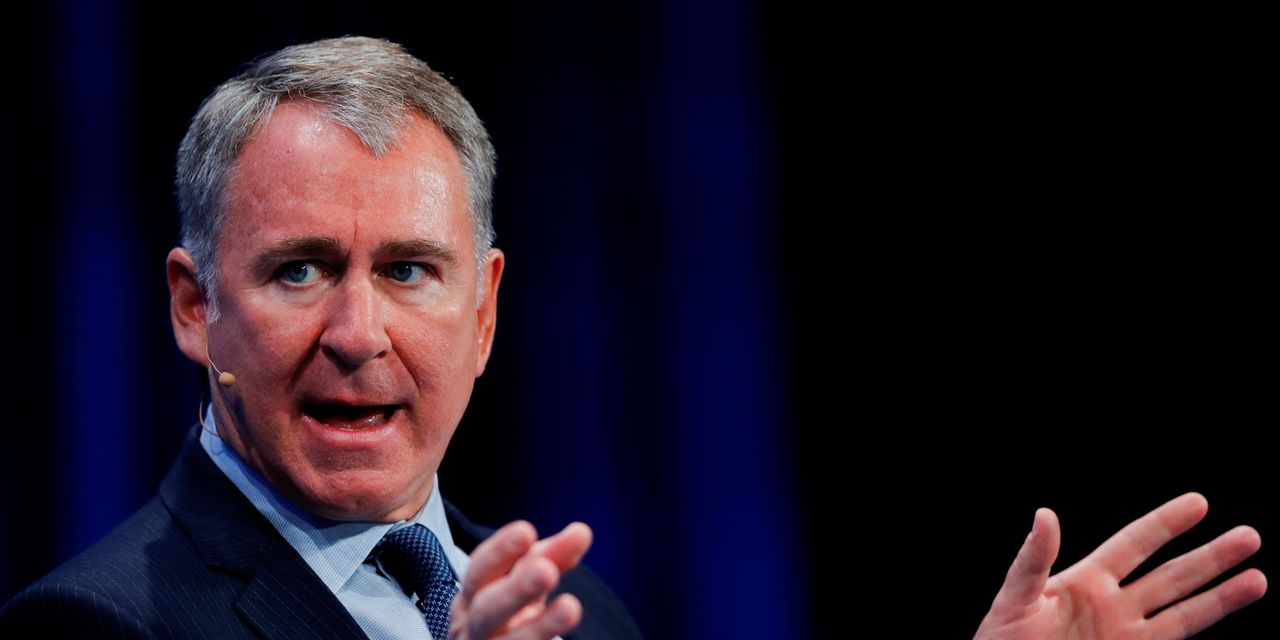

Citadel Securities is set to receive its first outside investment in a deal valuing the electronic-trading firm majority-owned by hedge fund billionaire
Ken Griffin
at around $22 billion.
Venture-capital firm Sequoia Capital and cryptocurrency investor Paradigm have agreed to invest $1.15 billion in the Chicago-based firm, the company told The Wall Street Journal. Sequoia partner
Alfred Lin
will also join Citadel Securities’ board.
Citadel Securities is managed separately from Citadel, the $43 billion hedge fund on which Mr. Griffin built his fortune, estimated by Forbes at $21.3 billion. Founded in 2002, Citadel Securities has grown into a global giant that trades equities, options, futures, bonds and other assets, handling about 27% of the shares that change hands in the U.S. stock market each day, according to its website. Much of that volume comes from processing trades for online brokerages such as
Robinhood Markets Inc.
The deal will give Citadel Securities capital to continue expanding globally, the company said, and could be a precursor to an initial public offering for the business. There is no guarantee the firm will go ahead with a listing, and there are no plans to launch one imminently.
Sequoia, one of the country’s largest venture firms with roughly $80 billion under management, has backed companies including Airbnb Inc. and Google before they were publicly traded. Paradigm is focused on crypto and Web3, a reimagining of the internet, areas Citadel Securities is likely to incorporate in the future as they become more regulated.
To date, Mr. Griffin has been a crypto skeptic and avoided trading digital currencies in his businesses even as they have soared in price and popularity. In October, he said Citadel Securities didn’t trade crypto because of a lack of regulatory clarity.
The explosion in trading volumes and volatility across financial markets during the coronavirus pandemic boosted Citadel Securities’ revenue. In 2020, net trading revenue was $6.7 billion, almost double the previous high in 2018. Net trading revenue in 2021 was even higher, according to a person familiar with the matter. Citadel Securities has been led by Chief Executive Peng Zhao since 2017.
Last year’s Reddit-fueled trading frenzy in
GameStop Corp.
and other so-called meme stocks drew attention to Citadel Securities’ relationship with online brokerages.
Some small investors active on social media have accused Citadel Securities of masterminding the Jan. 28, 2021, trading restrictions in which brokerages limited customers’ ability to buy GameStop and a number of other stocks. Citadel Securities has denied any role in the trading restrictions, which punctured a huge rally in meme stocks. Brokerages have said they imposed the curbs to address large margin calls from the clearinghouse for U.S. stock trades. In November, a federal judge dismissed a lawsuit accusing Robinhood and Citadel Securities of colluding to stop investors from buying meme stocks, citing a lack of evidence.
Still, the episode fueled regulatory scrutiny of the firm and its business practices. Securities and Exchange Commission Chairman
Gary Gensler
has floated the idea of banning payment for order flow, the practice in which trading firms pay brokerages such as Robinhood and TD Ameritrade for handling their customers’ orders. Citadel Securities paid more than $1.1 billion for order flow during the first nine months of 2021, making it the biggest source of such payments, Bloomberg Intelligence data shows.
Mr. Griffin has considered deal making previously. The Journal reported in 2015 that Citadel was considering going public, a move that the hedge-fund firm had also weighed before the financial crisis. The Journal in 2019 reported Blackstone had been in talks to buy a stake in both Citadel Securities and Citadel, with firm executives estimating at the time the hedge fund had a value of between $5 billion and $7 billion.
Write to Cara Lombardo at cara.lombardo@wsj.com and Alexander Osipovich at alexander.osipovich@dowjones.com
Copyright ©2022 Dow Jones & Company, Inc. All Rights Reserved. 87990cbe856818d5eddac44c7b1cdeb8
24World Media does not take any responsibility of the information you see on this page. The content this page contains is from independent third-party content provider. If you have any concerns regarding the content, please free to write us here: contact@24worldmedia.com

Common Mistakes When Using Athletic Field Tarps

High-Performance Diesel Truck Upgrades You Should Consider

Warehouse Optimization Tips To Improve Performance

Fire Hazards in Daily Life: The Most Common Ignition Sources

Yellowstone’s Wolves: A Debate Over Their Role in the Park’s Ecosystem

Earth Day 2024: A Look at 3 Places Adapting Quickly to Fight Climate Change

Millions of Girls in Africa Will Miss HPV Shots After Merck Production Problem

This Lava Tube in Saudi Arabia Has Been a Human Refuge for 7,000 Years

Four Wild Ways to Save the Koala (That Just Might Work)

National Academy Asks Court to Strip Sackler Name From Endowment

Ways Industrial Copper Helps Energy Production

The Ins and Out of Industrial Conveyor Belts